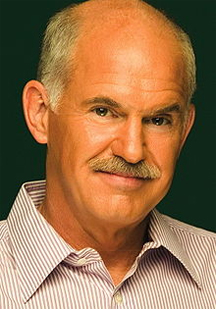ATHENS, (Reuters) – Greece’s cabinet decided early today to back Prime Minister George Papandreou’s proposal for a referendum on a European Union aid deal, a government spokesman said.

“The cabinet expressed its support,” said government spokesman Elias Mossialos. “The referendum will take place as soon as possible, right after the basics of the bailout deal are formulated.”
Some ministers leaving the 7-hour cabinet meeting said they had expressed criticism of the decision but decided to support the government ahead of a key confidence vote in parliament.
Caught unawares by his high-risk gamble, the leaders of France and Germany summoned Papandreou to crisis talks in Cannes today to push for a quick implementation of Greece’s new bailout deal ahead of a summit of the G20 major world economies.
Six senior members of the ruling PASOK socialist party, angered by his decision to call a plebiscite on the 130 billion euro rescue package agreed only last week, said Papandreou should make way for “a politically legitimate” administration.
A leading PASOK lawmaker quit the party, narrowing Papandreou’s already slim parliamentary majority, and two others said Greece needed a government of national unity followed by snap elections, which the opposition also demanded.
Euro zone leaders thrashed out Greece’s second financial rescue since last year, in return for yet more austerity, in the hope that it would ease uncertainty surrounding the future of the 17-nation single currency.
Instead, financial markets suffered another bout of turmoil yesterday due to the new political uncertainty and the risk that long suffering Greeks may reject the bailout.
The euro fell nearly three cents against the dollar and the risk premium on Italian bonds over safe-haven German Bunds hit a euro lifetime high, raising Rome’s borrowing costs to levels that proved unsustainable for Ireland and Portugal.
European bank shares dived and the Athens Stock Exchange suffered its biggest daily drop since October 2008, with the general index shedding 7.7 percent.
INCREDULITY
European politicians expressed incredulity at Papandreou’s announcement on Monday evening that took everyone by surprise, including his own finance minister.
“It’s difficult to see what the referendum is going to be about. Do we want to be saved or not? Is that the question?” Swedish Foreign Minister Carl Bildt said.
In a statement issued after French President Nicolas Sarkozy and German Chancellor Angela Merkel conferred by telephone, Sarkozy’s office said: “France and Germany are determined to ensure, with their European partners, the full implementation in the quickest time frame, the decisions adopted at the summit, which are today more important than ever.”
The renewed uncertainty is likely to embarrass G20 host France as it tries to coax China into throwing the euro zone a financial lifeline.
Business executives in Greece expressed despair at how the country was being run and markets speculated on whether Italy will be the next euro zone country to slide into a debt crisis.
Jean-Claude Juncker, who chairs meetings of euro zone finance ministers, refused to rule out a Greek debt default.
“The Greek prime minister has taken this decision without talking it through with his European colleagues,” he said in Luxembourg.
Asked whether a Greeks “no” vote would mean bankruptcy for Greece, Juncker responded: “I cannot exclude that this would be the case, but it depends on how exactly the question is formulated and on what exactly the Greeks people will vote on.”
DEFECTIONS
Papandreou, whose party has suffered several defections as it pushes waves of austerity through parliament despite mass protests, said he needed wider political backing for the budget cuts and structural reforms demanded by international lenders.
But his problems deepened dramatically after the announcement.
The conservative opposition called for snap elections. “Elections are a national necessity,” opposition New Democracy party leader Antonis Samaras told reporters.





